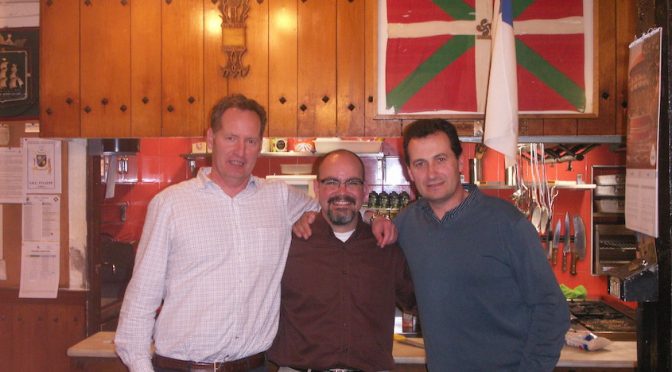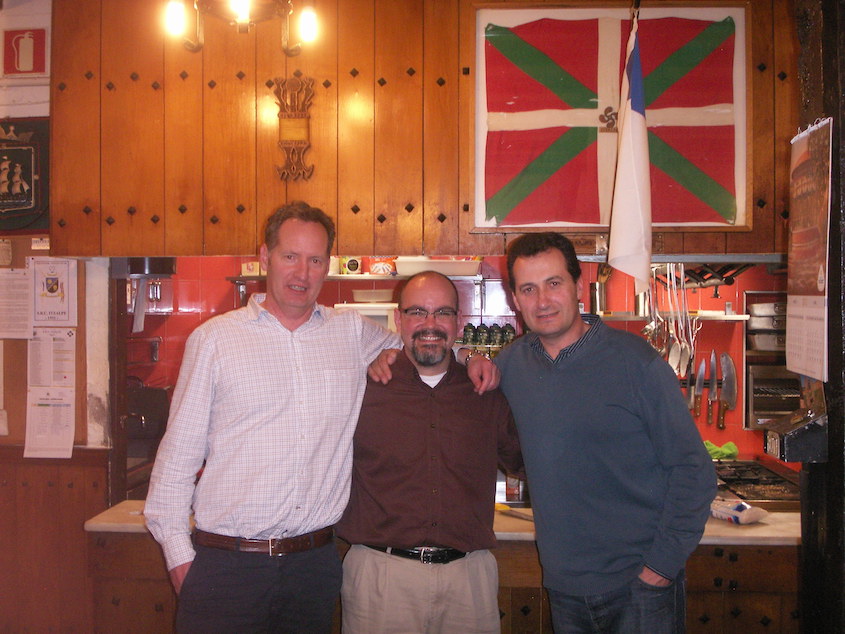Perhaps the best steak I have ever had was at one of the Txokos – the gastronomic clubs – in Donostia. A few friends of mine were members and took me for dinner one evening. In the heart of the old town – the Parte Vieja – of the city, it was an almost nondescript building from the outside, but inside was filled with tables for dining and a large kitchen. Txokos are so important in Basque society, at least for men, that my uncle built a small one in the back of his garage, a place he could escape and have dinners with friends.
- The name Txoko comes from the Basque word zoko and means nook or corner. The importance of these gastronomic societies is reflected in the fact that the mayor of Donostia is required to dine at each of the 75 Txokos in the city each year.
- Even before the first formal Txoko or society was formed, it was already common for workers from outside the city to come to the sagardotegis – the cider houses – and spend “all day playing and chatting, eating charred cod and salted sardines, stuffing themselves to the brim with cider, while their wives and daughters waited for them to have dinner.” These cider houses were temporary, following the cider season and supply.
- Perhaps the first society for “eating and singing,” La Fraternal, was founded in 1843 in the old part of Donostia. It was followed by the Unión Artesana, founded in 1870. From the very beginning, these societies codified the male-only nature of their clubs, prohibiting women from participating. These first clubs also had roles in the local society, for example planning theatrical performances and participating in the carnival of Donostia, including the tamborrada. It wasn’t until about 1900 that a society dedicated solely to food was established, the Cañoyetan. By 1911, Donostia had some 50 clubs. From Donostia, clubs spread throughout Gipuzkoa and eventually to other parts of the Basque Country. Today, it is estimate there are some 1000 clubs across the Basque Country.
- The txokos have been seen as a bastion of conservative custom and it was a slow process to allow women to participate. At first, women were completely banned from even entering. In the 1950s, some started allowing women to come, but forbid them from going into the kitchen or the bar. However, the most conservative ones banned women from participating even in the 1980s. This eventually caused significant controversy as the mayor of Donostia customarily dined at this Txoko – Gaztelubide – every eve of the patron saint’s day. That women were barred from attending ultimately led to the mayor to change this custom. There are now txokos such as Andra Mari which are comprised entirely of women, but which do not exclude men from participating.
- Txokos, despite their exclusionary nature, have been a place where men of different classes can meet as equals. During Franco’s time, because the txokos tended to ban political discourse, they were one of the few places where Euskara could be spoken and sung. This actually had the paradoxical effect of strengthening these unique Basque institutions.
- Membership in a Txoko is either hereditary or through sponsorship. Membership could be passed from a man through his widow to his son, but the woman herself couldn’t be a member. Of course, this is changing with time, though even today, women are typically allowed only as companions to men, not on their own merit.
Primary sources: Estornés Zubizarreta, Idoia; Arpal Poblador, Jesús. SOCIEDADES POPULARES. Auñamendi Encyclopedia, 2022. Available at: https://aunamendi.eusko-ikaskuntza.eus/en/sociedades-populares/ar-110524/; Txoko, Wikipedia
Discover more from Buber's Basque Page
Subscribe to get the latest posts sent to your email.




3 thoughts on “Basque Fact of the Week: Txokos, the Gastronomic Societies”